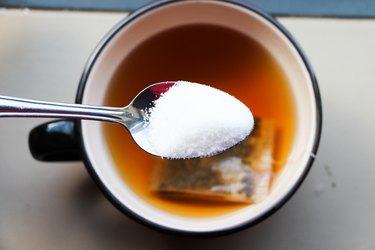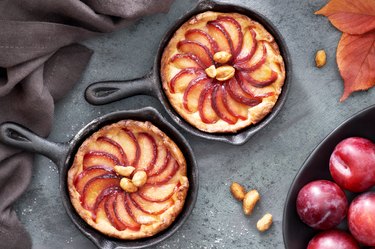
To understand diverticulitis, you must first understand diverticulosis. Diverticulosis occurs when pockets or pouches form along the wall of the large intestines. It's very common, as about 35 percent of American adults over the age of 50 have this condition. Most people with diverticulosis have no symptoms and are unaware they even have this condition.
However, at least five percent of people with diverticular disease eventually develop a serious complication called diverticulitis, which occurs when one or more of these pouches becomes inflamed or infected.
Video of the Day
Video of the Day
Symptoms of diverticulitis include abdominal cramping, especially on the left side, along with constipation, nausea, diarrhea, vomiting, chills, fever, and sometimes blood in the stool. Diverticulitis requires urgent medical care, and depending on symptom severity, hospitalization and surgery may be needed. Treatment usually involves rest, pain management, antibiotic therapy, and a special diet to help reduce symptoms and allow the bowel to rest while it heals.
Tip
If you suffer an episode of diverticulitis, follow your doctor's advice on regarding diet and a treatment plan. After the diverticulitis has resolved, an optimal diet for most people is rich in high-fiber foods, including fruits, vegetables and whole grains.
Diet for Diverticulitis
The best diet for diverticulitis depends on the severity of the condition. Because the gut is inflamed and needs to heal, your doctor may recommend a clear liquid or low-fiber diet as part of your treatment plan. These diet recommendations are temporary, with the goal of transitioning back to your normal diet within a matter of days.
Simple diverticulitis, which is a milder form of this condition where the pouch does not develop an abscess, tear or hole, typically responds well to home care and a low-fiber diet. This diet allows solid foods but restricts whole grains, beans, nuts and seeds, and only allows fruits and vegetables that are canned or peeled and cooked.
More complicated cases of diverticulitis often require hospitalization and, once food or drink is allowed, a diet comprised of clear liquids, such as no-pulp fruit juice, broth, gelatin, tea and sports drinks. The goal is to follow this liquid diet only temporarily, and advance back to solid foods when tolerated.

Sugar and Diverticulitis
Although you may have heard that sugar is bad for diverticulitis, there no direct evidence linking sugar to this condition. In fact, the clear liquid diet that is often recommended in the first day or two of treatment includes many sugar-containing foods, such as gelatin, fruit juice and sports drinks. But there may be a connection between diverticulitis and sugar intolerance after all — in people who also have irritable bowel syndrome (IBS).
Diverticulitis and IBS share some common symptoms, particularly cramping, constipation and diarrhea, and people with IBS are more likely to develop diverticular disease. Also, one study found that simply having diverticulitis quadrupled the risk of developing IBS.
So it's possible that excess amounts of certain sugars, such as lactose from milk or the fructose found in fruit, may be poorly tolerated in people who have IBS along with diverticulitis.
Some people with IBS are also sensitive to sugar alcohols, which naturally occur in some fruits and vegetables, and are used as sweeteners in many no-sugar-added foods. If you have IBS or diverticulitis and certain foods seem to aggravate your symptoms, let your doctor know. You can also ask for referral to a dietitian who specializes in gastrointestinal nutrition.
Diverticulosis Diet
A diet rich in high-fiber foods has been shown to reduce the risk of developing diverticulosis, but how diet helps to prevent the complication of diverticulitis is less clear. Data from the Health Professionals Follow-up Study, which reviewed the long-term diets and health status of over 46,000 adults, linked a diet pattern low in fruits, vegetables and whole grains and a diet high in red meat to an increased risk of diverticulitis.
No specific link to sugar consumption was found. But research results on this topic have been mixed. A February 2017 research review of 19 studies that explored fiber's role in diverticular disease concluded there was not enough high-quality evidence to show that a high-fiber diet prevents diverticulitis.
Another common diverticulosis diet recommendation is the restriction of nuts, seeds and popcorn, due to the presumption these substances cause trauma in the lining of the intestines, triggering diverticulitis.
However, as knowledge of diverticular disease has improved in recent years, this recommendation has been refuted. In fact, review of data from the Health Professionals Follow-up Study determined that consumption of nuts, corn and popcorn did not increase the risk of diverticulosis — or diverticulitis.
The Bottom Line
If you have been told you have diverticulosis, eating a diet rich in fruits, vegetables and whole grains may help. If you suffer an episode of diverticulitis, follow your doctor's recommendation for a temporary clear liquid or low-fiber diet, transitioning back to a higher-fiber diet once the inflammation or infection has resolved.
Other Considerations
If you have diverticular disease, follow your doctor's recommendations for diet and medical management of your condition. Seek medical care if you have gastrointestinal symptoms such as abdominal cramping, nausea, diarrhea or vomiting. These symptoms, along with chills, fever or blood in the stool may indicate diverticulitis and seeing a doctor right away is essential.
Reviewed by Kay Peck, MPH RD
- World Journal of Gastrointestinal Pharmacology and Therapeutics: Diverticular Disease: A Therapeutic Overview.
- Gastroenterology: Western Dietary Pattern Increases, Whereas Prudent Dietary Pattern Decreases, Risk of Incident Diverticulitis in a Prospective Cohort Study
- Today's Dietitian: Diverticular Disease — A Reexamination of the Fiber Hypothesis
- Clinical Gastroenterology and Hepatology: Increased Risk for Irritable Bowel Syndrome After Acute Diverticulitis
- Gastroenterology: American Gastroenterological Association Institute Guideline on the Management of Acute Diverticulitis
- Gastroenterology and Hepatology: Low-FODMAP Diet for Treatment of Irritable Bowel Syndrome
- Merck Manual: Diverticulitis
- American Journal of Gastroenterology: Diarrhea-Predominant Irritable Bowel Syndrome Is Associated With Diverticular Disease: A Population-Based Study
- JAMA: Nut, Corn, and Popcorn Consumption and the Incidence of Diverticular Disease
- Nutrients: Role of Fiber in Symptomatic Uncomplicated Diverticular Disease: A Systematic Review
- Drugs in Context: Treatment of Diverticular Disease: An Update on Latest Evidence and Clinical Implications